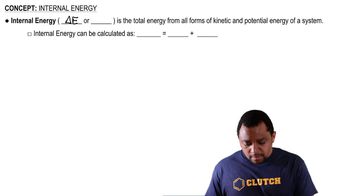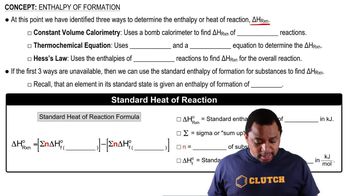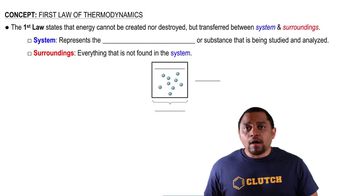The air within a piston equipped with a cylinder absorbs 565 J of heat and expands from an initial volume of 0.10 L to a final volume of 0.85 L against an external pressure of 1.0 atm. What is the change in internal energy of the air within the piston?

The change in internal energy for the combustion of 1.0 mol of octane at a pressure of 1.0 atm is 5084.3 kJ. If the change in enthalpy is 5074.1 kJ, how much work is done during the combustion?
 Verified step by step guidance
Verified step by step guidance
Verified video answer for a similar problem:
Key Concepts
Internal Energy

Enthalpy

Work in Thermodynamics

A gas is compressed from an initial volume of 5.55 L to a final volume of 1.22 L by an external pressure of 1.00 atm. During the compression the gas releases 124 J of heat. What is the change in internal energy of the gas?
When 1 mol of a fuel burns at constant pressure, it produces 3452 kJ of heat and does 11 kJ of work. What are ΔE and ΔH for the combustion of the fuel?
Determine whether each process is exothermic or endothermic and indicate the sign of ΔH. a. natural gas burning on a stove b. isopropyl alcohol evaporating from skin c. water condensing from steam Determine whether each of the following is exothermic or endothermic.
Determine whether each process is exothermic or endothermic and indicate the sign of ΔH. a. natural gas burning on a stove b. isopropyl alcohol evaporating from skin c. water condensing from steam Indicate the sign of ΔH for the following processes.
Determine whether each process is exothermic or endothermic and indicate the sign of ΔH. a. dry ice evaporating b. a sparkler burning c. the reaction that occurs in a chemical cold pack used to ice athletic injuries
